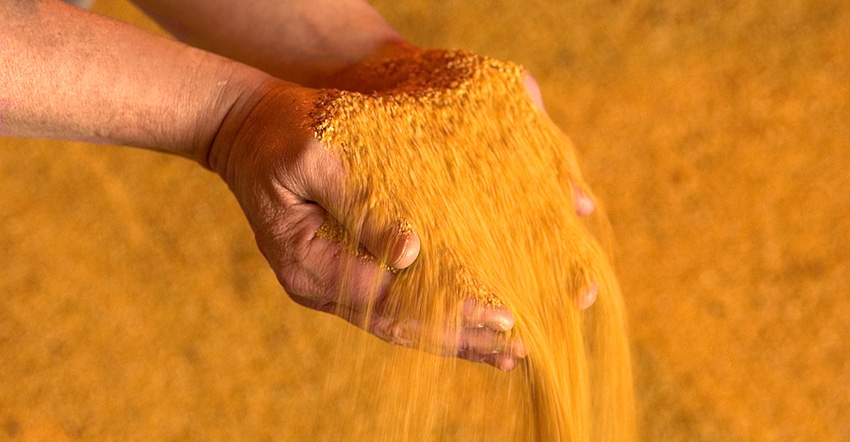April 17, 2020

COVID-19 and low oil prices may dry up supplies of distillers grains. Many ethanol plants have already or may soon cut back on production due to low oil prices and reduced demand for ethanol due to COVID-19 shelter-in-place orders.
There are at least three good alternatives to distillers grains in livestock rations, according to Warren Rusche, South Dakota State University Extension beef feedlot management associate.
1. Oilseed meal. Soybean meal will be the most widely available in the Cornbelt, and in some other regions sunflower, canola or other oilseed meals could be options. Soybean meal is often considered the “gold standard” of protein supplements because of its high crude protein concentration and consistency, he says. Compared to distillers, soybean meal will have less rumen undegradable protein which could be of concern with lighter cattle with higher metabolizable protein requirements, Rusche says.
2. Commercial supplements. These are available in both dry and liquid formulations. Dry supplements can be formulated with or without urea, while most liquid supplements are urea and molasses based. A key advantage for commercial supplements is that the formulations are consistent and can include all necessary vitamins, minerals, and medications, Rusche says.
3. High-protein forages. Certain forages, such as high-protein alfalfa or early cut grass, could supply all or a portion of the supplemental protein required. But they will likely result in reduced dietary energy concentration due to the substitution of concentrate for forage. In a recent SDSU silage feeding experiment, steers fed twice the roughage (approximately 6% vs. 12%) required an additional 14 days on feed.
Nutritionist needed
Check with a qualified nutritionist to evaluate all the options and consequences of changing rations. It also may be time to evaluate dietary crude protein levels, especially if the cost per unit of protein is increasing.
Replacing distillers with a supplement with increased crude concentration (such as soybean meal) would result in greater corn inclusion and therefore increased risk of sub-acute acidosis.
Also, moving away wet or modified distillers could affect cattle feeding behavior and increase amount of sorting in the bunk.
Because distillers grain typically contains relatively high amounts of phosphorus, switching protein sources may require a reformulation of the vitamin or trace mineral supplement as well.
Source: SDSU, which is solely responsible for the information provided and is wholly owned by the source. Informa Business Media and all its subsidiaries are not responsible for any of the content contained in this information asset.
You May Also Like




